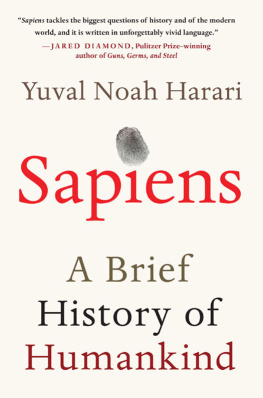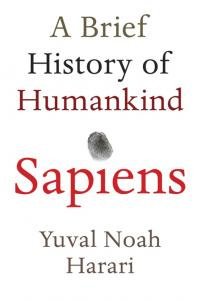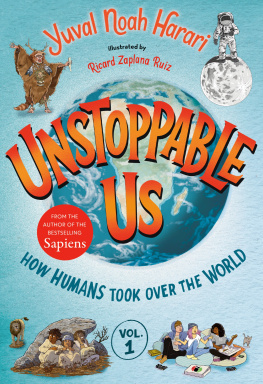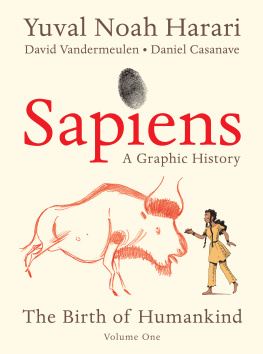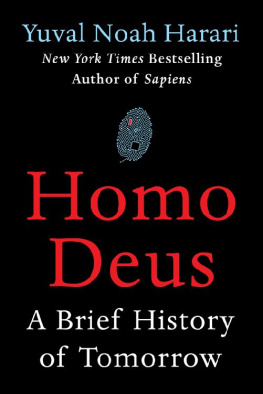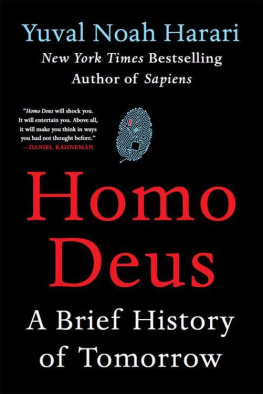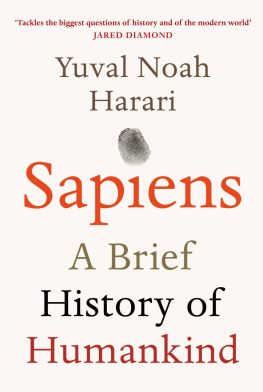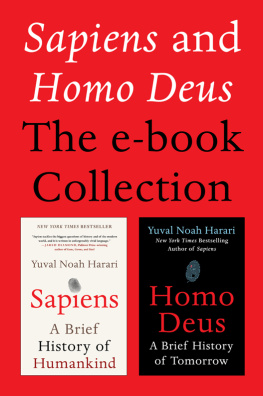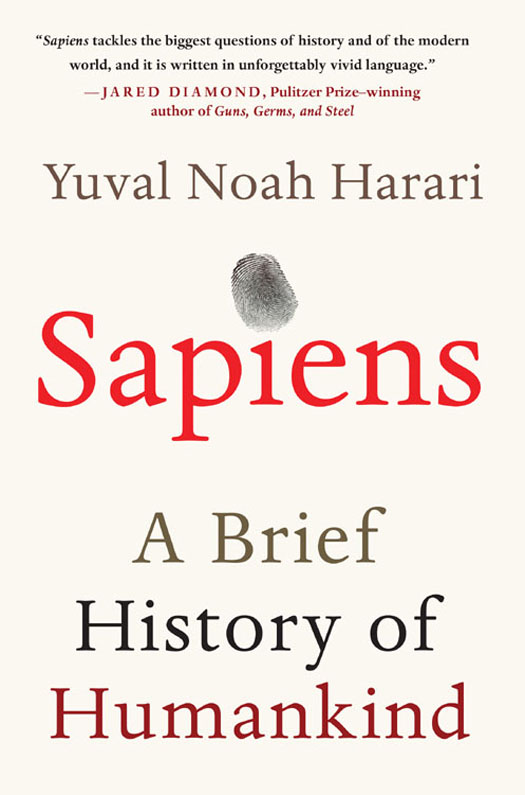In loving memory of my father,
Shlomo Harari
Contents
Years Before the Present |
13.5 billion | Matter and energy appear. Beginning of physics. Atoms and molecules appear. Beginning of chemistry. |
4.5 billion | Formation of planet Earth. |
3.8 billion | Emergence of organisms. Beginning of biology. |
6 million | Last common grandmother of humans and chimpanzees. |
2.5 million | Evolution of the genus Homo in Africa. First stone tools. |
2 million | Humans spread from Africa to Eurasia. Evolution of different human species. |
500,000 | Neanderthals evolve in Europe and the Middle East. |
300,000 | Daily usage of fire. |
200,000 | Homo sapiens evolves in East Africa. |
70,000 | The Cognitive Revolution. Emergence of fictive language. Beginning of history. Sapiens spread out of Africa. |
45,000 | Sapiens settle Australia. Extinction of Australian megafauna. |
30,000 | Extinction of Neanderthals. |
16,000 | Sapiens settle America. Extinction of American megafauna. |
13,000 | Extinction of Homo floresiensis. Homo sapiens the only surviving human species. |
12,000 | The Agricultural Revolution. Domestication of plants and animals. Permanent settlements. |
5,000 | First kingdoms, script and money. Polytheistic religions. |
4,250 | First empire the Akkadian Empire of Sargon. |
2,500 | Invention of coinage a universal money.
The Persian Empire a universal political order for the benefit of all humans.
Buddhism in India a universal truth to liberate all beings from suffering. |
2,000 | Han Empire in China. Roman Empire in the Mediterranean. Christianity. |
1,400 | Islam. |
| The Scientific Revolution. Humankind admits its ignorance and begins to acquire unprecedented power. Europeans begin to conquer America and the oceans. The entire planet becomes a single historical arena. The rise of capitalism. |
| The Industrial Revolution. Family and community are replaced by state and market. Massive extinction of plants and animals. |
The Present | Humans transcend the boundaries of planet Earth. Nuclear weapons threaten the survival of humankind. Organisms are increasingly shaped by intelligent design rather than natural selection. |
The Future | Intelligent design becomes the basic principle of life? Homo sapiens is replaced by superhumans? |
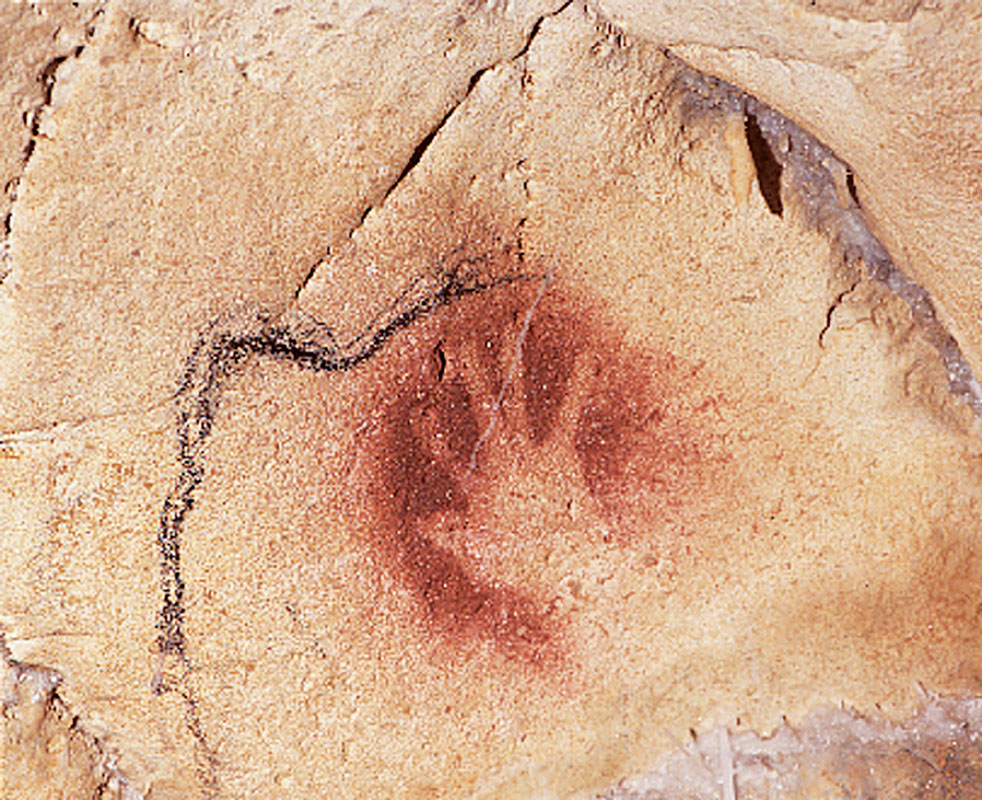
1. A human handprint made about 30,000 years ago, on the wall of the Chauvet-Pont-dArc Cave in southern France. Somebody tried to say, I was here!
{ ImageBank/Getty Images Israel.}
ABOUT 13.5 BILLION YEARS AGO, MATTER, energy, time and space came into being in what is known as the Big Bang. The story of these fundamental features of our universe is called physics.
About 300,000 years after their appearance, matter and energy started to coalesce into complex structures, called atoms, which then combined into molecules. The story of atoms, molecules and their interactions is called chemistry.
About 3.8 billion years ago, on a planet called Earth, certain molecules combined to form particularly large and intricate structures called organisms. The story of organisms is called biology.
About 70,000 years ago, organisms belonging to the species Homo sapiens started to form even more elaborate structures called cultures. The subsequent development of these human cultures is called history.
Three important revolutions shaped the course of history: the Cognitive Revolution kick-started history about 70,000 years ago. The Agricultural Revolution sped it up about 12,000 years ago. The Scientific Revolution, which got under way only 500 years ago, may well end history and start something completely different. This book tells the story of how these three revolutions have affected humans and their fellow organisms.
There were humans long before there was history. Animals much like modern humans first appeared about 2.5 million years ago. But for countless generations they did not stand out from the myriad other organisms with which they shared their habitats.
On a hike in East Africa 2 million years ago, you might well have encountered a familiar cast of human characters: anxious mothers cuddling their babies and clutches of carefree children playing in the mud; temperamental youths chafing against the dictates of society and weary elders who just wanted to be left in peace; chest-thumping machos trying to impress the local beauty and wise old matriarchs who had already seen it all. These archaic humans loved, played, formed close friendships and competed for status and power but so did chimpanzees, baboons and elephants. There was nothing special about humans. Nobody, least of all humans themselves, had any inkling that their descendants would one day walk on the moon, split the atom, fathom the genetic code and write history books. The most important thing to know about prehistoric humans is that they were insignificant animals with no more impact on their environment than gorillas, fireflies or jellyfish.
Biologists classify organisms into species. Animals are said to belong to the same species if they tend to mate with each other, giving birth to fertile offspring. Horses and donkeys have a recent common ancestor and share many physical traits. But they show little sexual interest in one another. They will mate if induced to do so but their offspring, called mules, are sterile. Mutations in donkey DNA can therefore never cross over to horses, or vice versa. The two types of animals are consequently considered two distinct species, moving along separate evolutionary paths. By contrast, a bulldog and a spaniel may look very different, but they are members of the same species, sharing the same DNA pool. They will happily mate and their puppies will grow up to pair off with other dogs and produce more puppies.
Species that evolved from a common ancestor are bunched together under the heading genus (plural genera). Lions, tigers, leopards and jaguars are different species within the genus Panthera. Biologists label organisms with a two-part Latin name, genus followed by species. Lions, for example, are called Panthera leo, the species leo of the genus Panthera. Presumably, everyone reading this book is a Homo sapiens the species sapiens (wise) of the genus Homo (man).
Genera in their turn are grouped into families, such as the cats (lions, cheetahs, house cats), the dogs (wolves, foxes, jackals) and the elephants (elephants, mammoths, mastodons). All members of a family trace their lineage back to a founding matriarch or patriarch. All cats, for example, from the smallest house kitten to the most ferocious lion, share a common feline ancestor who lived about 25 million years ago.

